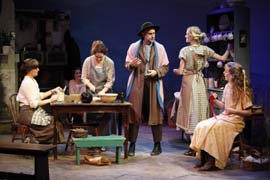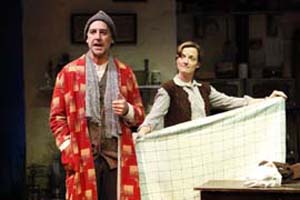
Paulanne Simmons
Irish Rep Celebrates "Dancing at Lughnasa"
"Dancing at Lughnasa"
Directed by Charlotte Moore
Irish Repertory Theatre
132 West 22nd Street, between 6th and 7th Avenues
Opened October 30, 2011
Wednesday-Saturday at 8pm, 3pm matinees on Wednesday, Saturday and Sunday
Tickets: $55 & $65 212-727-2737 or www.irishrep.org
Closes December 11, 2011
Reviewed by Paulanne Simmons Nov. 6, 2011
 |
| L-R: Orlagh Cassidy, Aedin Moloney, Jo Kinsella, Michael Countryman, Rachel Pickup and Annabel Hagg. Photo by Carol Rosegg. |
Brian Friel’s 1991 play, "Dancing at Lughnasa"may be a memory play that takes place in the fictional town of Ballybeg, Ireland. And it may be based on the playwright’s aunts, who lived on the coast of Donegal. But the play has an unmistakable resemblance to that other well-known memory play, Tennessee Williams’ s "The Glass Menagerie."
All one has to do is change the name of Williams’s narrator from Tom, to Michael; substitute Tom’s sister, and mother for Michael’s five spinster aunts; and switch the setting from St. Louis to the small Irish town. But of course there are also many differences.
There is none of "Dancing at Lughnasa"’s ever-present Catholicism in "The Glass Menagerie." Tom is a young man who takes part in the action in his remembered past, while Michael is still a child and never actually seen. And, while in Williams’s play the overriding symbol is the fragile glass menagerie, in Friel’s, much of the symbolism is related to dance. The play takes place in 1936, just before Lughnasa, the Celtic festival of the first fruits, celebrated with bonfires and dancing. For the unhappy women in this play, dance signifies lost youth, love, romance, sex, in short life.
Irish Rep’s production, directed by Charlotte Moore, gives dance special meaning throughout the play, from the aunts’ exuberant clogging to the romantic and titillating dancing of the two lovers, Aunt Chris (Annabel Hagg) and Gerrry (Kevin Collins), the restless and rakish father her son, Michael (Ciaran O’Reilly).
 |
| Michael Countryman and Orlagh Cassidy. Photo by Carol Rosegg. |
Antje Ellermann’s spare and bleak set, which brings together the bare outdoors with the comfortless kitchen of the five Mundy sisters, Maggie, Agnes, Rose and Chris, stands in stark contrast to the life-affirming dancing.
While sisters Maggie (Jo Kinsella) , Agnes (Rachel Pickup), Rose (Aedin Moloney) and Chris still long for a better life, schoolteacher Kate (Orlagh Cassidy) takes on the full responsibility for the family. Cassidy is wonderful as the finger-waging Kate who refuses to collapse. And Kinsella makes the feisty Maggie a worthy opponent.
Michael Countryman is charming as the wayward Father Jack, the only brother, who returns from a Ugandan leper colony more pagan than Christian. But it is Hagg and Collins who highlights the hopelessness of life in this household. Chris and Gerry’s love affair has produced Michael, but little happiness, at least not for Chris. For the Welsh Gerry is as unreliable as the radio nicknamed "Marconi," although he is certainly a lot more lovable.
From the moment the grown-up Michael walks onstage, we know
the unity of this family is doomed. It comes as no surprise when Kate, the
main breadwinner of the family loses her job, and Rose and Agnes lose their
clients when a knitwear factory opens in the village. But thanks to Friel’s
evocative language and Moore’s fine direction, we are more than willing
to watch the inevitable come to pass.

| museums | NYTW mail | recordings | coupons | publications | classified |